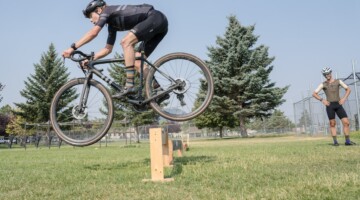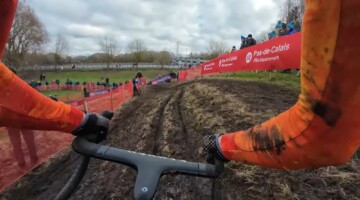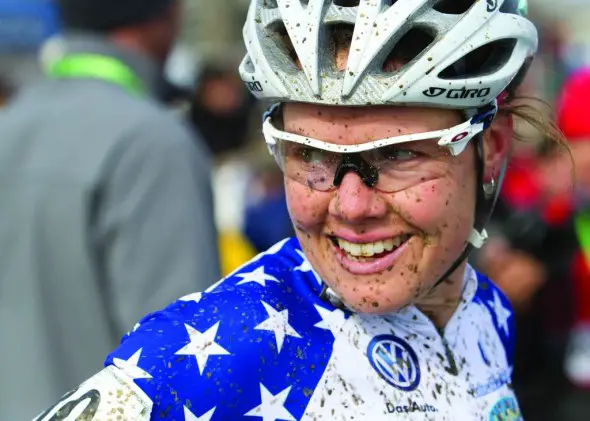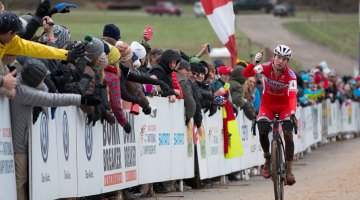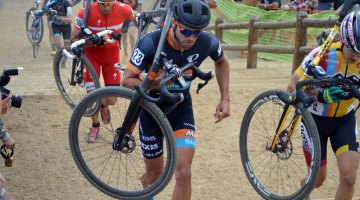by Chris Bagg
It’s Tuesday, January 29th, 2013, five days before the first UCI Cyclocross World Championships to be held in the United States. Georgia Gould is at home in Fort Collins, Colorado, in the middle of a construction zone. “My husband and I bought a new house in November and it’s been a little bit more of a project than we thought it would be. I don’t have a kitchen. The only room that has furniture in it is the bedroom.”
She’d returned home the day before from racing the Cincinnati Kings Cyclocross International in Ohio, which she used as a final tune-up ahead of the Worlds race in Louisville. Gould placed second in Cincy, behind Team LUNA Chix teammate Katerina Nash, and then began what should have been a simple trip back to Denver. Her airline can- celled her Sunday morning flight, and then delayed the re-booked one, getting Gould home in the small hours between Sunday and Monday morning. Most of the racers chose to stay on the east side of the states in the lead up to Worlds, but for Georgia, the trip was worth it. “I don’t get a lot of time at home,” she says. “And I don’t need to spend five days in a hotel in Kentucky. At Nationals I got to Madison on Thursday and even then I felt like I had been there for a week! I was like, when are we gonna race? My God, my patience is wearing thin! So I get to sleep in my own bed and aside from that you’re away from the hubbub of Worlds, which even though it’s cool can be really draining for an entire week.”
Talking to Gould can be a little exhausting. She speaks very quickly and peppers her statements with quotations from her internal mono- logue. It’s like having a conversation with a ventriloquist and his dummy: the words come from the same source but—at the same time—a slightly different persona. There is Present Georgia and At-That-Moment-In- Time Georgia. Gould is not unaware of this branching tendency in her dialogue, and as madcap as her narration can be, there’s always part of her monitoring what is being said.
There’s always part of her monitoring what you’re saying, too. I ask her to walk me through the rest of the week between Tuesday and the race in Louisville. She pauses a moment and says, “Well, I’ll probably be doing huge hours and tons of intervals so I can get faster between now and then. You know, last ditch effort here. I’ll probably just ride my trainer 24 hours a day.” Then she lets me and my dumb question off the hook. “No, no, it’s a few rides and some runs. Just business as usual.” Then, as if she can’t help herself, she adds, “I mean I have a very secret Worlds training program that I can’t tell you anything about.” She plays the role that jesters played for royal courts: deflating egos, keeping self- regard in check. She doesn’t use sarcasm, doesn’t directly suggest that I asked a silly question. She points, instead, to the fact that preparing for races is simpler than what we’ve made of it—her week at home in Colo- rado is a simple affair before a very important event, but just another important event in a string of important events. She is, by this point in her career, a consummate professional.
Worlds, however, does not go well. A rider falls in front of Gould and several other riders two turns into the race. Gould goes down and then has trouble extricating her bike from the pileup. By the time she’s remounted her bike, any hope of the result she’d aimed for is gone. “It was really disappointing and frustrating,” she says. “It was one of those bad luck things, but at the same time you’re like, ‘Well it’s a good thing I was training for all of January—good thing I’m really fit and ready to get on the podium at Worlds, because my race was pretty much over. It was frustrating but at the same time, the race was such an awesome showing of U.S. cyclocross and our spectators, so I wasn’t just gonna quit. I was going to do as well as I could given the circumstances.”

